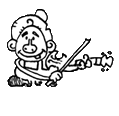A FiddleHed named Bob wrote to say that after playing banjo for seven years, he became fascinated with what his fiddler pals were doing. “How on earth can those fiddle players do that?” he asked himself. “I decided I’d give it a try.”
Hats off to you Bob!
Though I haven’t learned banjo, I have studied and enjoyed other instruments: mandolin, guitar, bass, voice, and piano. And in each case, I naturally used what I knew on the fiddle to learn a new instrument. When I first picked up a mandolin in college, I was able to play classical pieces on it that I learned as a kid. This was a great way to immediately enjoy and start to learn a new instrument.
A few years later, after learning to play simple chords on the mandolin, I was able to learn guitar using the same mental model and practice methods. Learn each chord well, then practice the transition between two chords over and over again, day by day. Eventually, I learned how to play melodies on guitar by picking out the fiddle tunes I already had learned on it.
In this way, I used something I already knew as leverage to learn a new thing.
Now you may be thinking, “I’ve never played another instrument, so I have no leverage. I’m just going to have to use brute force to learn this thing!”
But chances are, you’ve probably already leveraged things you know to learn new things. For example, if you learn how to bow on the D string, then it becomes easier to learn to bow on the A string. Even at that early stage, you have already leveraged what you know to learn something new.
If you’ve learned a D major scale, then you can leverage it to learn G major scale. Since they have the same fingering, you don’t have to re-do all that mental work. You can concentrate on the physical practice of feeling the notes on a new string.
You can do the same thing with tunes. If you’ve learned Oh Susannah starting on open D string, then you can leverage that to play it in G major and A major using the same exact fingering.
And further down the line, you can use the same melody to learn the melody in F major. When you do that, the fingering will be totally different. But if you’ve practiced the melody a lot already, then you’ll have a strong mental model of it. You can use this mental model as leverage to learn how to play it in this more challenging scale. And at the same time, this leverage helps you learn the new scale.
Another more friendly way to look at this is that old tunes like Oh Susannah become old friends that help you along the way, over and over again.
What other forms of leverage can you think of? Some things that come to mind:
- If you can sing a song, then this can be leveraged to play it on the fiddle.
- If you’ve practiced a martial art, perhaps you can leverage that training to help you learn fiddle.
- In fact, if you’ve regularly practiced anything else, that ability to practice can be leveraged to help you practice the fiddle.
And who knows? Maybe someday you’ll leverage your fiddle skills to learn something else…


Had fun thinking about this today in terms of language. I love to learn languages. But it has taken a while for the old cliche that music is a language to ring true with the fiddle for me. (insert 80s pop song. . . Music is a language can’t you read? Smiths?) anyway. Today the slurs, scales, and pedals felt like like learning verb declensions. I may not be ready to navigate the trains without getting lost, but I think I can order from the menu. Looking forward to getting lost on the fiddle train and leveraging my language skills. thanks. We should get you a conductor hat.
Such a great analogy and insight! Keep up the deciphering and you will be fluent soon enough!
One way you can leverage language skills is to look for repeating patterns. sometimes a single phrase is repeated 3-4 times in a tune. Once you learn the first quarter, scan forward to see if it’s repeated.
So True
This really does work !!!